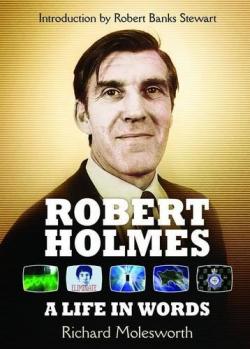Robert Holmes: A Life in Words
Wednesday, 6 November 2013 - Reviewed by

Robert Holmes: A Life in Words
Written by Richard Molesworth
Released by Telos Publishing, October 2013
Richard Molesworth is from that generation and his admiration for Robert Holmes is obvious before the scent of old tobacco arises from the long-locked ottoman in Holmes's study. He's largely writing to the converted, of course: most of his readers will need little persuading to wish themselves among the Lyons' Corner House lunch club of the last generation of weekly topical illustrated magazine journalists in the 1950s, alongside Holmes, Robert Banks Stewart, Wilfred Greatorex and other familiar names from the television drama series of the next two decades. Molesworth has a knack for the presentation of documentary material in a conversational style, and the reader is taken through the battle to receive a regular stream of television commissions with ease. The bravado which Holmes developed as work became easier to come by gives way in the 1980s to a harsher reality as the number of opportunities gradually contracts. Those who have read Richard Marson's JN-T: The Life and Scandalous Times of John Nathan-Turner will not be surprised to find the mid-1980s emerge from Molesworth's text as a time when a feeling that they had been betrayed by one of their own haunted producers, editors and writers accustomed to convivial and creative meetings in the offices, bars and restaurants of Shepherds Bush.
The subtitle A Life in Words gives away that this book isn't really a biography. Much standard information is missing. There is little comment on Holmes's parents and upbringing, and nothing about his schooling. The influence of his wartime experiences in the Far East on his writing isn't considered as thoroughly as it might be, given the preoccupations evident in some of his best-remembered work. While the milieu of those who worked on the dying illustrated magazines is fairly well-sketched, we have no sense of how Robert Holmes edited John Bull, which had been one of the most infamous but financially successful titles of the early twentieth century under its first editor, the swindler and Liberal MP Horatio Bottomley, and which in the late 1950s - Holmes's era - maintained a lively contemporary-dramatic visual style combining the kitchen-sink domestic with the incongruous and dangerous. The advance of cirrohsis of the liver passes without the chance being taken to look at the alcohol-laden work culture of the 1960s and 1970s and how far Holmes participated in it, however keen he was to get back from London to his cottage in Leighton Buzzard. There are occasional slips which would have surely been caught by an informed proofreader, such as the reference to a writer called 'Alan Owens' when presumably Alun Owen is meant, and as with many non-fiction books from small publishers one regrets the absence of an index.
Some of the weaknesses of the book might arise from Molesworth's evident admiration for Holmes, but that of course brings strengths. These include the 'Interludes' in which Molesworth breaks his narrative of Holmes's career with scene breakdowns and story outlines from Holmes's various projects, some, but not all, being early versions of his Doctor Who episodes. Pedants who for long years have insisted on calling the last two episodes of The Trial of a Time Lord 'Time Inc.' may be taken aback to find that by the time of Holmes's death this provisional title had been overtaken by another more suited to the episodes' content and satirical target. The transcript of the 'script conference' enacted for the benefit of the makers of Whose Doctor Who confirms the hitherto unfashionable reading that a specific script is actually being discussed. Other revelations about Holmes's time on Doctor Who are thrown in without comment, some frustratingly unsourced so it's unclear whether one is reading something for which there is documentary proof or an authorial inference from unidentified evidence. There's some consideration of how corporate and personality politics affected the direction of Doctor Who in 1977 as Holmes left, though one wonders whether Chris Boucher would have flourished as script editor of Doctor Who in the way he seems to have at Blake's 7. The most intriguing possibilities the book offers are those of Holmes's unfinished projects. If Northcliffe (or The Chief), the historical biodrama he was to write under the producership of Louis Marks, had reached fruition, Holmes might have been respected by a wider circle, though as this book shows television writing could be a fickle business even in a supposed past golden age.
Robert Holmes: A Life in Words may leave one with more questions than answers about this fondly-remembered storyteller, but the quantity of information it gathers into one place earns it a place on the Doctor Who fan bookshelf, as does the warmth with which Holmes is remembered by colleagues quoted in the book, whether specially interviewed by Molesworth - such as Robert Banks Stewart - or gathered from earlier publications and documentaries. It's an admiring and competent read which could have benefited from better editing and the overcoming of some production flaws - such as the incomplete table of Holmes's works - which it's hoped will be achieved at a later printing. Molesworth takes us into the pipe smoke, and while he doesn't clear it, the man within can be seen more clearly than he was before.








